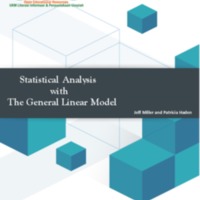Statistical Analysis with The General Linear Model
Dublin Core
Description
This course is about a large and complex set of statistical methods tied together by a unifying conceptual framework known as “The General Linear Model” (GLM). This model can be used to answer an amazing variety of research questions within an infinite number of different experimental designs. Basically, the GLM can be used to test almost any hypothesis about a dependent variable (DV) that is measured numerically (e.g., height, income, IQ, age, time needed to run a 100-yard dash, grade
point average, etc.; but not categorical DVs like eye color, sex, etc.). In a first statistics course, students will have seen some special cases of the GLM without knowing
it. For example, the various kinds of “t-tests” (one-sample, between-subjects, within-subjects, etc.) are special cases of the GLM. So are correlation, regression, and the Analysis of Variance (ANOVA). We will not assume any prior knowledge of these techniques, but students should realize, if the new methods seem familiar, that they are now seeing the big picture.
point average, etc.; but not categorical DVs like eye color, sex, etc.). In a first statistics course, students will have seen some special cases of the GLM without knowing
it. For example, the various kinds of “t-tests” (one-sample, between-subjects, within-subjects, etc.) are special cases of the GLM. So are correlation, regression, and the Analysis of Variance (ANOVA). We will not assume any prior knowledge of these techniques, but students should realize, if the new methods seem familiar, that they are now seeing the big picture.
Contributor
Cut Rita Zahara
Rights
Creative Commons
Type
Files
Collection
Citation
Jeff Miller and Patricia Haden, “Statistical Analysis with The General Linear Model,” Open Educational Resources (OER) , accessed March 4, 2026, https://oer.uinsyahada.ac.id/items/show/327.


